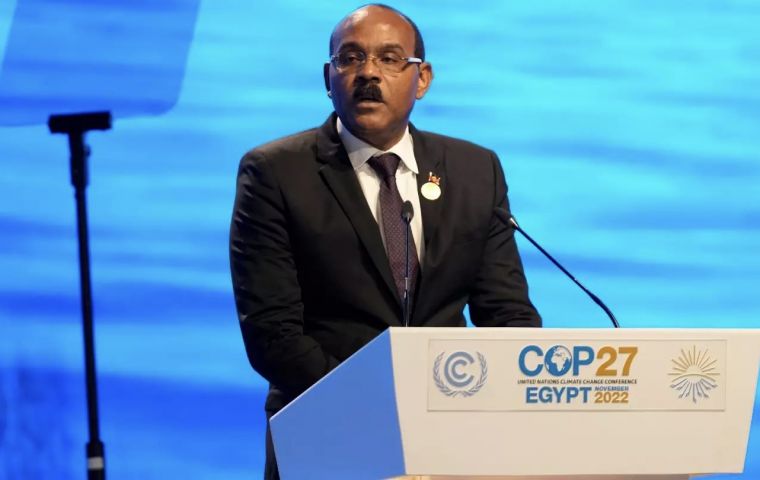MercoPress. South Atlantic News Agency
AOSIS countries want oil companies to fund climate action through taxation
 Browne spoke on behalf of AOSIS, a group of countries accounting for very little of the world's gas emissions
Browne spoke on behalf of AOSIS, a group of countries accounting for very little of the world's gas emissions Antigua and Barbuda's Prime Minister Gaston Browne Tuesday launched an appeal on behalf of the Alliance of Small Island States (AOSIS) for oil companies to pay a “global carbon tax” and thus help undo some of the damage caused climate-change-wise.
Speaking at the Conference of the Parties (COP27) of the United Nations Framework Convention on Climate Change in the Egyptian Red Sea port of Sharm El-Sheikh, Browne insisted that the nations he represented suffered some of the worst impacts.
“The oil and gas industry continues to earn almost 3 billion United States dollars daily in profits,” Browne also said.
“It is about time that these companies are made to pay a global carbon tax on their profits as a source of funding for loss and damage. Profligate producers of fossil fuels have benefited from extortionate profits at the expense of human civilization. While they are profiting, the planet is burning,” he added.
He also underlined that those surpluses were “more than enough money to cover the costs of major climate damage in developing countries.”
The idea had already been raised at COP27 by UN Secretary-General António Guterres, who called on “all governments” to implement taxes on windfall profits: “Let's redirect the money to people suffering from rising energy and food prices and to countries suffering loss and damage caused by the climate crisis,” Guterres said.
Small island nations, including those in the Caribbean such as Antigua and Barbuda, have long been calling for international aid and funding to address the damage caused to their countries by climate change.
The Alliance of Small Island States (AOSIS) is an intergovernmental organization of coastal and small island countries established in 1990 to consolidate the voices of these countries as they address climate change, to which they are particularly vulnerable due to sea level rise, coastal erosion, and saltwater intrusion.
Meanwhile, Senegal's President Macky Sall told attendees that developing nations in Africa were also insisting on the need for increased funding in order to cope with the challenges posed by climate change while resisting calls for an immediate shift away from fossil fuels that could drive economic growth. “Let's be clear, we are in favor of a reduction of greenhouse gas emissions. But we Africans cannot accept that our vital interests be ignored,” he stressed.




Top Comments
Disclaimer & comment rulesCommenting for this story is now closed.
If you have a Facebook account, become a fan and comment on our Facebook Page!